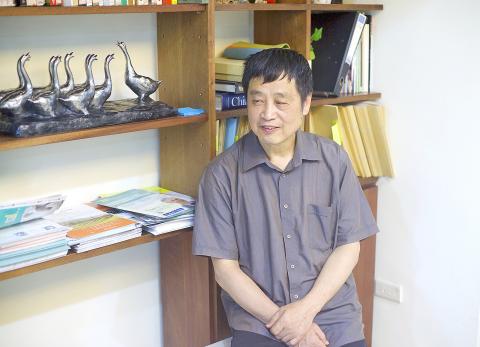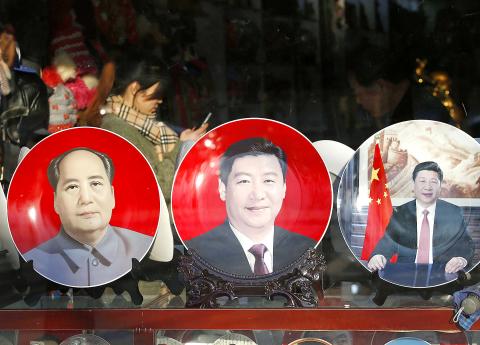For Xu Youyu (徐友漁), the Cultural Revolution is a page in China’s history the country has yet to turn. Xu, a professor of philosophy, political dissident and signatory of Charter 08, a manifesto that calls for political reform in China, worries that nostalgia has warped people’s historical memory of those tumultuous years.
“Many Chinese misunderstand the Cultural Revolution as a glorious time of freedom of speech and association,” Xu says.
This revisionist account, he adds, papers over the tragic and violent effects wrought by this decade-long period of upheaval, and obscures a crucial lesson: “to pin a country’s hopes on a strongman will result in unprecedented disaster.”

Photo: Reuters
Xu is disheartened by the “re-emergence of a Cultural Revolution mindset” in China. He says that Chinese President Xi Jinping’s (習近平) attempts to become “the second Mao Zedong (毛澤東)” will only spell trouble.
Though some in Taiwan may question democracy and envy Xi, the country must reaffirm its commitment to freedom and its democratic way of life, Xu says. Against the resurgence of authoritarianism and the rise of illiberal political culture, Xu hopes the country will prove a bulwark of liberal values.
CULTURAL REVOLUTION REDUX

Photo: Philip Tsien
Xu is wary of China’s reversion to Mao-style politics. He hears echoes of the Cultural Revolution in today’s political climate, and fears the consequences.
Xi’s arbitrary anti-corruption campaign mirrors Mao’s peremptory Cultural Revolution-era purges. Xu warns that just as Mao’s purges led to chaos and injustice, so too does Xi’s crackdown undermine the rule of law.
For Xu, this is but one example of Xi’s many efforts to emulate “Mao’s excesses,” such as crafting a cult of personality and centralizing power, to the detriment of the Chinese people. He says that under Xi, the Chinese Communist Party (CCP) has run roughshod over civil society, tightening its grip over political, social and cultural life.

Photo: Reuters
“Officials worship at the altar of Xi, but they have done little to help the people,” Xu says. Instead, Xi and the CCP have moved decisively toward authoritarian governance, as evidenced by their decision to abolish constitutional limits on presidential terms.
Xu, however, remains cautiously optimistic. “Though the current situation is bleak, civil society will continue to grow and develop, however slowly. It is just a matter of time,” he says. “Once born, a baby cannot re-enter the womb.”
HOPE ACROSS THE STRAIT
Xu sees Taiwan as an encouraging and necessary counterpoint to Xi’s unabashed authoritarian posture. He says that since emerging as one of Asia’s most vibrant democracies, the country has been a testament to the enduring strength and appeal of liberal values.
Xu says that while “Taiwanese democracy is not perfect,” its problems pale in comparison to those found in China. A free and dynamic press, diverse civil society, an independent judiciary: for Xu, these institutions, and the ideals they represent, form what he hopes will be Taiwan’s enduring legacy.
He cautions Taiwanese, however, against taking their society for granted. The allure of “efficient and powerful government” under one-party or strongman rule is great, but must be resisted, Xu says. To those who cast doubt on the merits of Taiwan’s democracy, Xu’s suggestion is simple: “They can spend some time in China and see what they prefer. I think the choice will be clear.”
“Taiwanese democracy is young, and the threats it faces are serious,” he says. He adds that Taiwanese should reaffirm their support for the “fundamental values that undergird their free and stable society” and safeguard their democracy.
UNEASY FUTURE
“China’s current situation is hardly a full repeat of the Cultural Revolution,” Xu acknowledges. He says that the Chinese Communist Party’s emphasis on stability rules out the massive social unrest and violence of the 1960s and 1970s. After all, China has embraced a market economy.
“But the circumstances are still grave,” he says.
Xu says that though there exists an active group of young Chinese committed to liberal values and political reform, a majority are either unaware or unconcerned. While he hopes Chinese exchange students studying in Taiwan can “bring home the idealism” that abounds among young Taiwanese, he is unsure of the impact this would have on political conditions in China.
As the CCP extends its reach into Chinese society, he says, the further away the goal of achieving constitutional democracy appears.
To Xu, the specter of the Cultural Revolution still looms.

On April 26, The Lancet published a letter from two doctors at Taichung-based China Medical University Hospital (CMUH) warning that “Taiwan’s Health Care System is on the Brink of Collapse.” The authors said that “Years of policy inaction and mismanagement of resources have led to the National Health Insurance system operating under unsustainable conditions.” The pushback was immediate. Errors in the paper were quickly identified and publicized, to discredit the authors (the hospital apologized). CNA reported that CMUH said the letter described Taiwan in 2021 as having 62 nurses per 10,000 people, when the correct number was 78 nurses per 10,000

As we live longer, our risk of cognitive impairment is increasing. How can we delay the onset of symptoms? Do we have to give up every indulgence or can small changes make a difference? We asked neurologists for tips on how to keep our brains healthy for life. TAKE CARE OF YOUR HEALTH “All of the sensible things that apply to bodily health apply to brain health,” says Suzanne O’Sullivan, a consultant in neurology at the National Hospital for Neurology and Neurosurgery in London, and the author of The Age of Diagnosis. “When you’re 20, you can get away with absolute

May 5 to May 11 What started out as friction between Taiwanese students at Taichung First High School and a Japanese head cook escalated dramatically over the first two weeks of May 1927. It began on April 30 when the cook’s wife knew that lotus starch used in that night’s dinner had rat feces in it, but failed to inform staff until the meal was already prepared. The students believed that her silence was intentional, and filed a complaint. The school’s Japanese administrators sided with the cook’s family, dismissing the students as troublemakers and clamping down on their freedoms — with

As Donald Trump’s executive order in March led to the shuttering of Voice of America (VOA) — the global broadcaster whose roots date back to the fight against Nazi propaganda — he quickly attracted support from figures not used to aligning themselves with any US administration. Trump had ordered the US Agency for Global Media, the federal agency that funds VOA and other groups promoting independent journalism overseas, to be “eliminated to the maximum extent consistent with applicable law.” The decision suddenly halted programming in 49 languages to more than 425 million people. In Moscow, Margarita Simonyan, the hardline editor-in-chief of the